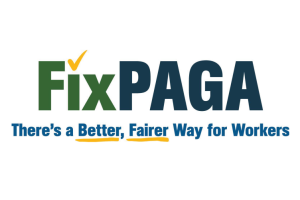 The California Chamber of Commerce and the Fix PAGA coalition, representing non-profits, social justice advocates, family farmers, health care providers and businesses, are supporting legislation to reform California’s broken Private Attorneys General Act (PAGA).
The California Chamber of Commerce and the Fix PAGA coalition, representing non-profits, social justice advocates, family farmers, health care providers and businesses, are supporting legislation to reform California’s broken Private Attorneys General Act (PAGA).
The agreement was announced by Governor Gavin Newsom, Senate President pro Tempore Mike McGuire and Assembly Speaker Robert Rivas yesterday after months of discussions between labor advocates and the coalition.
“We came to the table and hammered out a deal that works for both businesses and workers, and it will bring needed improvements to this system. This proposal maintains strong protections for workers, provides incentives for businesses to comply with labor laws and reduces litigation,” Governor Newsom said.
If passed by the Legislature, the legislation would reform PAGA to ensure workers retain a strong tool to resolve labor claims and receive fair compensation, while limiting the shakedown lawsuits that hurt employers and employees.
“This package provides meaningful reforms that ensure workers continue to have a strong vehicle to get labor claims resolved, while also limiting the frivolous litigation that has cost employers billions without benefiting workers,” CalChamber President and CEO Jennifer Barrera said. “We thank Governor Newsom, Senate President pro Tempore McGuire and Assembly Speaker Rivas for navigating this agreement, and we encourage the Legislature to pass this package quickly.”
Legislation Details
The core elements of the reform package are:
- Employee Share of Penalty
- Increases share employees receive from any penalty from 25% to 35%.
- Standing
- Requires the employee (plaintiff) to personally experience the alleged violations brought in a claim.
- Alleged violations must have occurred within the last year (presently, there is no time limitation).
- Penalty
- Caps Penalties: For employers who proactively take steps to comply with the Labor Code before receiving a notice, the maximum penalty that can be awarded is 15% of the applicable penalty amount.
- Caps Penalties: For employers who take steps to fix policies and practices after receiving a PAGA notice, the maximum penalty that can be awarded is 30% of the applicable penalty amount.
- Reduces the maximum penalty where the alleged violation was brief or where it is a wage statement violation that did not cause confusion or economic harm to the employee (i.e. misspelling of company name or forgetting to add “Inc.” on the pay statement).
- Levels the playing field for employers who pay weekly by ensuring a penalty is adjusted. Presently, such employers are penalized at twice the amount because penalties accrue on a per pay period basis.
- Addresses derivative claims.
- Creates a new penalty ($200 per pay period) if an employer acted maliciously, fraudulently, or oppressively.
- Employer Right to Cure
- Expands which Labor Code sections can be cured, so employees are made whole quickly.
- Protects small employers by providing a more robust right to cure process through the state labor department (Labor and Workforce Development Agency) to reduce litigation and costs.
- Provides an opportunity for early resolution in court for larger employers.
- Strengthening Enforcement Agency
- The Administration will pursue a trailer bill to give the California Department of Industrial Relations (DIR) the ability to expedite hiring and filling vacancies to improve and expedite enforcement of employee labor claims.
- Judicial Discretion (Manageability)
- Codifies that a court may limit both the scope of claims and evidence presented at trial.
- Injunctive Relief
- Allows for injunctive relief.
A recent report found that since 2013 there have been nearly $10 billion in PAGA court case awards, but due to significant attorney fees, workers receive only a small portion of these awards. PAGA hurts virtually every industry and employer in California, including non-profits, local governments, family-run businesses and others.
“This agreement is important because it protects working people, who are the real engine behind California’s economic strength,” said Assembly Speaker Robert Rivas (D-Salinas). “It also recognizes companies that follow labor laws, and it puts more muscle into enforcement. I grew up watching farmworkers and employers find common ground, so it means a lot to me that so many groups came together and found consensus. This is a hard-earned agreement, and that makes the positive outcomes we’ll see for businesses and workers even better.”
The legislature will consider the PAGA reform legislation as early as this week. The deadline for measures to be withdrawn from the November 2024 ballot is June 27, 2024.
“Today’s agreement is critical to the long-term success of workers and businesses here in the Golden State,” said Senate President pro Tempore Mike McGuire (D-North Coast). “Commonsense reform of PAGA has been discussed for years, and thanks to the collaboration of all sides, including the work of the Governor, this agreement will continue to provide strong worker protections and implement long talked-about reforms. Next steps include working with Speaker Rivas to move legislation forward in the days to come.”
If the PAGA compromise measure is passed and signed by the Governor before June 27, the Fix PAGA coalition will remove its November 2024 PAGA reform measure from the ballot.


